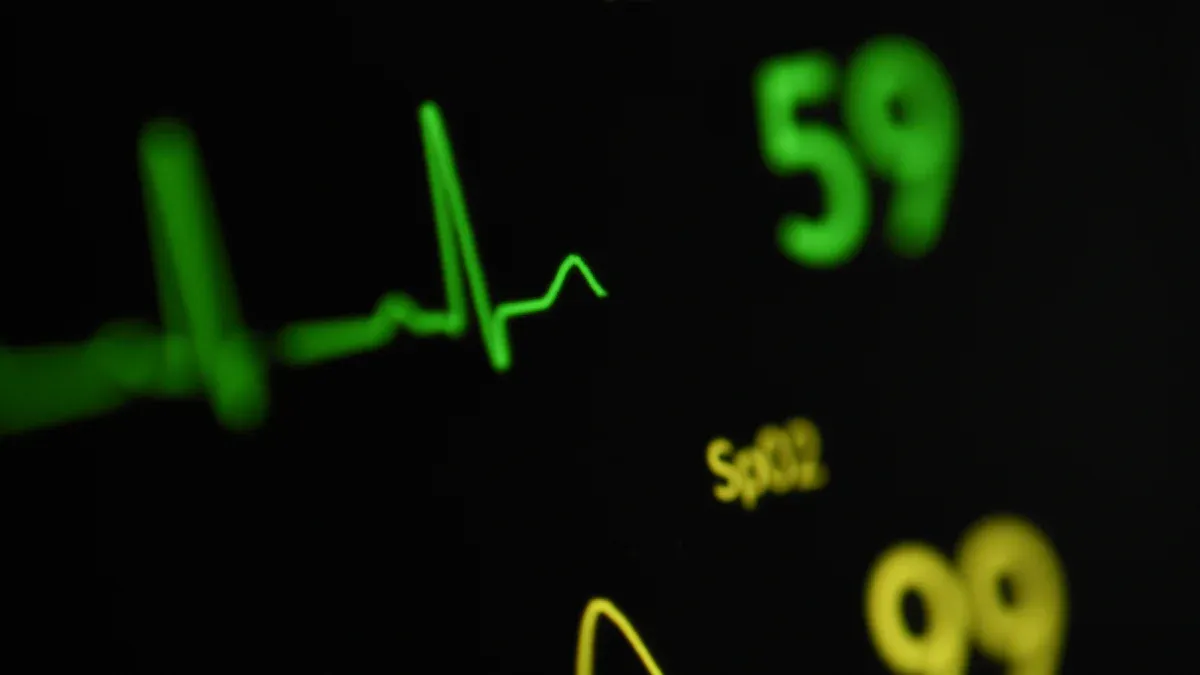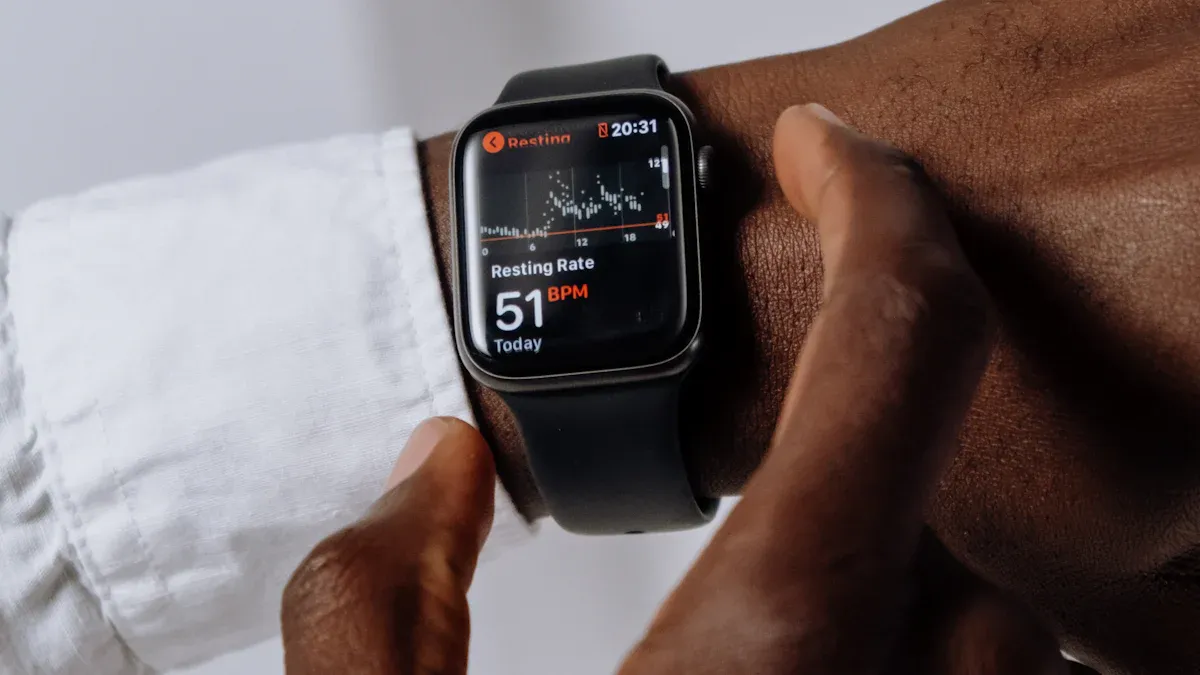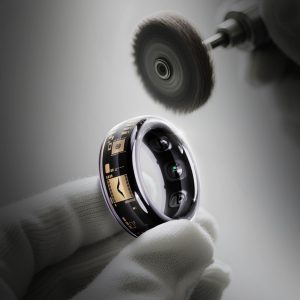
Your heart rate slows down at night because your body’s internal clock and special heart mechanisms signal it to do so during sleep. This natural process, called circadian rhythm, helps conserve energy. Scientists find that your mean heart rate drops by about 7.2% at night compared to the day, as shown below:
|
Period |
Mean Heart Rate (bpm) |
|---|---|
|
Daytime |
54.5 |
|
Nighttime |
50.5 |
Many studies show that your heart’s own clock and the central brain clock work together to control these changes. Health tech, like smart rings, lets you track sleep patterns and heart rate lower at night, helping you understand these important mechanisms.
Key Takeaways
-
Your heart rate gets slower at night. This happens because your body’s internal clock and your heart’s clock work together. They help you rest and save energy.
-
The parasympathetic nervous system is more active when you sleep. The vagus nerve is a big part of this system. It helps slow your heart and makes you feel calm.
-
Your heart rate changes during different sleep stages. It is lowest during deep sleep. It goes up during REM sleep. These changes show your body is recovering.
-
You can track your heart rate and sleep with smart devices. This can help you learn about your health. It can also help you find early signs of problems.
-
Going to bed at the same time every night is good for you. Living a healthy life helps your heart’s rhythm. This can make you feel better overall.
Heart Rate Lower at Night
Why It Happens
You might see your heart rate go down at night. This is normal and happens for a reason. Your body has a system called the autonomic nervous system. It helps control your heart. At night, this system changes to help you rest. The parasympathetic branch gets more active. It is also called the “rest and digest” system. This branch helps slow your heart and makes you feel calm. The sympathetic branch is less active at night. It usually makes your heart beat faster during the day.
-
The parasympathetic system uses the vagus nerve to slow your heart.
-
At night, you see more high-frequency heart rate variability. This means your body uses the vagus nerve more.
-
Your heart rate drops soon after you fall asleep because this change happens fast.
-
During deep sleep, your body uses the parasympathetic system even more. This makes your heart rate even lower at night.
-
Your heart rate changes with each sleep stage. Non-REM sleep makes your heart slow down the most. REM sleep can make your heart beat faster for a short time.
Tip: A lower heart rate at night shows your body is resting well.
You can see how your heart acts during sleep in this table:
|
Sleep Stage |
Autonomic Activity Changes |
Cardiovascular Outcome |
|---|---|---|
|
Non-REM Sleep |
More parasympathetic drive, less sympathetic activity |
Heart rate goes down; about 10% drop in mean arterial pressure |
|
REM Sleep |
Sympathetic activity comes back |
Heart rate and blood pressure go up quickly |
If you track your resting heart rate, you can notice these changes every night. Your heart rate at night can tell you about your sleep and how your body recovers.
Energy Conservation
Your body works hard all day, so it needs to save energy at night. One way it does this is by slowing your heart rate at night. When your heart beats slower, it uses less energy. Scientists found your body uses about 32% less energy when you sleep than when you are awake. This happens because your heart and other organs slow down.
Your resting heart rate drops while you sleep. This means your heart does not work as hard. It helps your body save energy for the next day. The autonomic nervous system helps by making the parasympathetic branch more active and the sympathetic branch less active. These changes make your heart rate lower at night and help your body recover.
-
A lower heart rate at night means your heart has less work.
-
Your body uses less oxygen and burns fewer calories.
-
You wake up feeling better because your body saved energy.
Note: Using smart devices to track your heart rate at night can help you see how well your body saves energy while you sleep.
When you watch your heart rate at night, you learn more about your health and how your body keeps you strong.
Sleep and Heart Rate
Heart Rate During Sleep Stages
You experience many changes in your body as you move through different stages of sleep. Heart rate during sleep does not stay the same. When you first fall asleep, your heart rate slows down to match your resting heart rate. As you enter light sleep, your heart rate during sleep drops a little more. When you reach deep sleep, your heart rate during sleep falls to its lowest point. Scientists find that during deep sleep, your heart rate during sleep can drop 20% to 30% below your resting heart rate. This stage helps your body recover and repair.
As the night goes on, you enter REM sleep. During REM sleep, your heart rate during sleep rises again. Your body acts almost like it is awake. The sympathetic nervous system becomes more active, so your heart rate during sleep increases and becomes less stable. You may notice your heart rate during sleep goes up and down quickly in this stage. These changes help your brain process memories and emotions.
Tip: If you track your heart rate during sleep, you can see these patterns. A steady drop in heart rate during deep sleep shows good sleep quality.
Metabolic Needs
Your body’s metabolic needs change during sleep. When you sleep, your body uses less energy. This is because your muscles relax and your body temperature drops. During deep sleep, your metabolic rate reaches its lowest point. Your heart rate during sleep also stays low, which helps save energy. Good sleep quality means your body can rest and repair itself.
The table below shows how metabolism and heart rate during sleep connect:
|
Aspect |
Summary |
|---|---|
|
Metabolic rate during sleep |
Drops to its lowest during deep sleep |
|
Heart rate during sleep |
Lowest in deep sleep, rises in REM sleep |
|
Sleep quality |
Better quality means more time in deep sleep and lower heart rate during sleep |
|
Sleep deprivation |
Raises metabolic rate and heart rate during sleep, lowers sleep quality |
If you do not get enough sleep or your sleep quality is poor, your heart rate during sleep may stay high. This means your body cannot rest well. Over time, poor sleep quality can affect your health. You can use smart devices to track your heart rate during sleep and see how well your body meets its metabolic needs.
Circadian Rhythm

Nighttime Signals
Your body follows a daily rhythm that helps control many functions, including your heart rate. This rhythm is called the circadian rhythm. It acts like a built-in timer that tells your body when to rest and when to be active. At night, your brain sends signals to slow your heart. The main control center for this rhythm sits in your brain. Scientists call it the suprachiasmatic nucleus, or SCN. The SCN uses both nerves and hormones to send messages to your heart.
Several hormones help carry these nighttime signals. These hormones work together to lower your heart rate and prepare your body for sleep. Here is a table showing some of the main hormones and how they help control your heart’s rhythm:
|
Hormonal Signal / Pathway |
Role in Circadian Regulation of Heart Rate / Cardiovascular Function |
|---|---|
|
Arginine Vasopressin (AVP) |
Acts as a neurotransmitter and hormone, helping control circadian rhythms and heart rate. |
|
Vasoactive Intestinal Peptide (VIP) |
Sends chemical signals from the SCN to other brain areas, shaping your daily rhythm. |
|
Cardiotrophin-like Cytokine |
May help the SCN control your heart’s rhythm. |
|
Prokineticin 2 (PK2) |
Helps pass circadian rhythm signals from the SCN. |
|
Epidermal Growth Factor (EGF) |
Supports circadian signaling from the SCN. |
|
Transforming Growth Factor α (TGFα) |
Another SCN signal that helps manage your daily rhythm. |
|
Feeding-Fasting Hormones |
These hormones, like leptin and ghrelin, help set the rhythm in your heart by linking eating patterns to your body’s clock. |
|
Autonomic Nervous System (ANS) |
Carries SCN signals to your heart, blending nerve and hormone messages to control your heart’s rhythm. |
Tip: When your circadian rhythm works well, your night time heart rates drop, helping your body rest and recover.
Body’s Internal Clock
You have an internal clock that keeps your body on a 24-hour schedule. This clock uses light from the environment to stay in sync with day and night. When you see sunlight in the morning, your clock resets. At night, darkness tells your clock to slow things down. Your heart has its own small clocks, too. These local clocks sit inside heart cells and help control the rhythm of your heartbeat.
The SCN in your brain acts as the master clock. It uses light to set the main rhythm. Other clocks in your body, like those in your heart, can also respond to food, temperature, and activity. These smaller clocks help fine-tune your heart’s rhythm. They use special genes and proteins to keep the rhythm steady. Even if your nerves stop sending signals, your heart’s rhythm still follows a day-night pattern. Scientists found that the heart’s pacemaker cells beat slower at night, even when they block nerve signals. This shows your heart’s rhythm comes from both the brain and the heart itself.
If your internal clock gets out of sync, your heart’s rhythm can change. This can lead to health problems. Keeping a regular sleep schedule and getting morning light helps your body’s rhythm stay healthy.
Note: Your body’s internal clock and heart clocks work together to keep your heart’s rhythm steady every day and night.
Heart’s Clock
Sinus Node and Funny Channel
Your heart has its own clock. This clock works inside the heart, not just in your brain. The sinus node acts as your heart’s natural pacemaker. It sets the rhythm for your heartbeat. During sleep, your heart rate drops. This happens because the sinus node follows a daily rhythm. Even if your brain’s signals stop, your heart keeps its own schedule.
The sinus node uses special ion channels to control your heartbeat. One important channel is called the “funny channel,” or HCN4. This channel helps your heart beat on its own. The funny channel carries a current that starts each heartbeat. Scientists found that the amount of this channel changes during the day and night. You have more funny channel activity during the day, so your heart beats faster. At night, the activity drops, and your heart slows down.
The funny channel lets your heart slow down at night, even if your nerves are not telling it to do so.
If you block the funny channel, your heart loses its normal day-night rhythm. This shows that your heart’s clock and the funny channel work together to control your heart rate, especially while you sleep.
Key Genes
Your heart’s clock depends on special genes. These genes turn on and off in a 24-hour cycle. They help control how your heart works at different times of day. Some of the most important genes include:
|
Gene |
Role in Heart’s Clock and Function |
|---|---|
|
Controls other heart genes and keeps the daily rhythm steady. |
|
|
KLF15 |
Links signals from BMAL1 to heart metabolism and rhythm. |
|
REV-ERB |
Keeps your heart’s daily rhythm stable and prevents problems with gene activity. |
|
SIRT3 |
Helps your heart make energy and handle stress, changing its activity day and night. |
Another gene, PER2, helps set your sleep and heart rate cycles. Changes in these genes can affect how your heart rate drops at night.
-
Studies show that genetics play a big role in how your heart rate changes at night.
-
About half of the differences in heart rate variability come from your genes.
-
These genetic effects stay strong across different ways of measuring heart rate.
Your heart’s clock, the sinus node, and these key genes all work together. They help your heart slow down at night, keeping you healthy while you sleep.
Monitoring Heart Rate During Sleep

Health Tracking Devices
Today, you can use smart devices to check your heart rate and sleep. These gadgets have sensors that watch your heart rate, movement, and body temperature at night. The Aura Ring by VERTU and the Oura Ring 3 are both known for being comfortable and accurate. The Aura Ring by VERTU uses photoplethysmography. This means it shines light on your skin and checks how blood moves in your finger. You get heart rate data right away, so you can notice changes in your resting heart rate.
Wearable devices also have accelerometers and gyroscopes. These sensors track how much you move while you sleep. This helps you learn how long you spend in each sleep stage. The Aura Ring by VERTU uses these sensors and AI to make detailed sleep reports. You can see your sleep patterns and how your heart rate changes at night. The Oura Ring 3 also has advanced sensors. It tracks sleep stages and heart rate variability, so you can understand your sleep quality better.
Tip: You can track your sleep at home without any pain. You will see how things like stress, noise, and light change your sleep every night.
Early Detection
Tracking your heart rate during sleep can help you find health problems early. If your heart rate variability looks strange, it might warn you about heart disease or stroke. It can also show changes in your mood or memory. The Aura Ring by VERTU can alert you if your resting heart rate or sleep quality is not normal. This gives you time to talk to a doctor before things get worse.
Watching your sleep over time helps you see if you are getting better or worse sleep. You can notice if new habits help your heart rate and health. Finding odd heart rate patterns early can help you stay healthy and avoid big problems.
|
Device |
Heart Rate Tracking |
Sleep Quality Insights |
Special Features |
|---|---|---|---|
|
Aura Ring by VERTU |
Real-time, AI-driven |
Detailed, personalized |
Anomaly alerts, luxury design |
|
Oura Ring 3 |
Continuous |
Comprehensive |
Body temperature, circadian tracking |
|
Fitbit Sense 2 |
Accurate |
Stage detection |
Stress and activity monitoring |
Note: These devices help you take charge of your sleep and heart health. You can see how well you sleep and act fast if you notice a problem.
Myths About Heart Rate at Night
Vagus Nerve
You might hear people say that your heart just slows down at night because you are relaxed. The real story involves a special nerve called the vagus nerve. This nerve acts like a messenger between your brain and your heart. When you fall asleep, the vagus nerve becomes more active. It sends signals that help your heart slow down and rest. Scientists have found that the vagus nerve controls how your heart rate changes during sleep. The vagus nerve boosts the parasympathetic system, which is your body’s “rest and digest” mode.
During sleep, the vagus nerve increases heart rate variability. This means your heart does not beat at the exact same speed all the time. Instead, it changes in a healthy way. The vagus nerve also helps your body respond to breathing and blood pressure changes at night. You can think of the vagus nerve as a conductor, making sure your heart follows the right rhythm while you sleep. Research shows that the vagus nerve has a bigger effect on your heart during sleep than when you are awake. This nerve helps your heart recover and keeps your body balanced.
Tip: A strong vagus nerve means better heart health and deeper sleep.
Common Misconceptions
Many people believe myths about heart rate and sleep. Here are some of the most common ones:
-
Your heart rate should always stay the same at night.
-
Only sleep stages matter for health, not heart rate variability.
-
A low heart rate at night always means you are healthy.
-
Wearable devices cannot give useful heart data.
-
Everyone has the same “normal” heart rate.
Current research shows that heart rate variability during sleep can warn you about health risks like stroke or depression. Different patterns in heart rate variability link to different health conditions. For example, high and jumpy heart rate variability may mean a higher risk of stroke, while low variability can point to depression. Heart rate variability shows how well your autonomic system works. It can catch problems that regular sleep tests miss.
|
Aspect |
Findings |
|---|---|
|
Varies by as much as 70 bpm between individuals |
|
|
Average Adult RHR |
About 65.5 bpm (±7.7 bpm) |
|
Gender Differences |
95% of men: 50-80 bpm; 95% of women: 53-82 bpm |
|
Age Influence |
RHR rises with age, peaks at 50, then drops |
|
BMI Influence |
Moderate BMI links to lower RHR |
|
Sleep Duration Influence |
Best RHR in people sleeping 7–7.5 hours |
|
Seasonal Variation |
RHR peaks in January, lowest in July |
|
Short-term Fluctuations |
Small changes (~3 bpm) over a week |
|
Implication |
No single ‘normal' RHR; your baseline is unique |
You can use wearable tech to track your own heart rate and spot changes early. This helps you take action before problems grow.
Your heart rate drops at night because your body’s internal and heart-specific clocks guide it to slow down during sleep. This natural slowdown helps your heart recover and supports better health. When you track your sleep and heart rate, you can:
-
See how your sleep patterns affect your heart.
-
Notice how lifestyle choices change your sleep quality.
-
Find ways to improve your sleep for a healthier heart.
Understanding your sleep and heart rate gives you the power to make smart choices for lifelong wellness.
FAQ
Why does your heart rate drop when you sleep?
Your body uses its internal clock to slow your heart at night. This helps you rest and recover. The change saves energy and supports good health.
Can you track your heart rate at night without going to a lab?
Yes! You can use smart rings like the Aura Ring by VERTU. These devices track your heart rate and sleep at home. You get easy-to-read reports on your phone.
What is a normal heart rate while you sleep?
Most adults see their heart rate drop to 40–60 beats per minute during deep sleep. Your normal range may be different. You can check your own baseline with a health tracker.
Tip: Your heart rate at night can change with age, fitness, and stress.
Does a lower heart rate at night mean you are healthier?
A lower heart rate at night often means your body rests well. It shows your heart does not work too hard. If your heart rate stays high, you may want to check your sleep habits.
How can you improve your heart rate at night?
You can set a regular bedtime, avoid caffeine late in the day, and keep your room cool and dark. Using a health tracker helps you see what works best for your sleep and heart.







